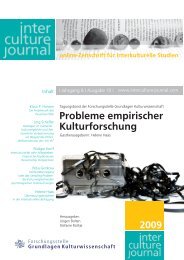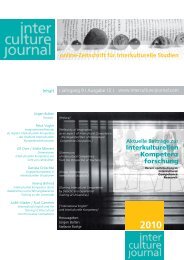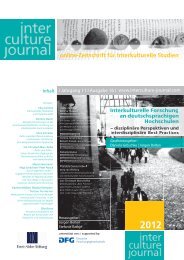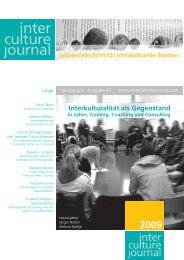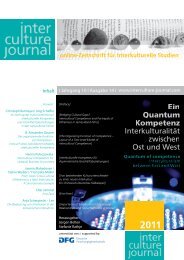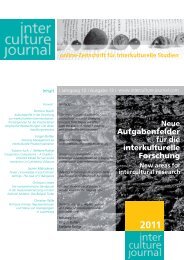Aktuelle Anwendungsfälle Interkultureller Kommunikation | Current ...
Aktuelle Anwendungsfälle Interkultureller Kommunikation | Current ...
Aktuelle Anwendungsfälle Interkultureller Kommunikation | Current ...
Erfolgreiche ePaper selbst erstellen
Machen Sie aus Ihren PDF Publikationen ein blätterbares Flipbook mit unserer einzigartigen Google optimierten e-Paper Software.
Dehmel / Li / Sloane: Intercultural competence development in higher education study abroad<br />
programs: A good practice example<br />
velopment of intercultural competence in higher education.<br />
The following parts provide background information and describe<br />
the program’s systematic and integrated design that<br />
builds on the re-conceptualisation and integration of selected<br />
pedagogical approaches.<br />
3. Defining the educational objective – intercultural<br />
competence<br />
The central objective of the ASBE program is to promote the<br />
development of intercultural competence of students, based<br />
on their short-term study abroad experience and on a comprehensive<br />
accompanying program before, during and after<br />
their stay abroad. The question what intercultural competence<br />
is, i.e. how it can be defined, is difficult, but needs to<br />
be addressed as the main starting point. Finding an accurate<br />
definition of intercultural competence as well as approaches<br />
to foster and assess it have always been essential concerns in<br />
the field of research on intercultural education and learning<br />
(Weidemann 2001, Bennett 2009, Bertelsmann Stiftung /<br />
Fondazione Cariplo 2009). For decades, similar worries on the<br />
lack of conceptual consensus have been echoed by researchers<br />
and trainers (for example by Koester / Wiseman / Sanders<br />
1994:3-7, Bradford et al. 1998:2, Lustig / Koester 2006:64).<br />
Due to this complexity, the present chapter only provides a<br />
very brief overview and outlines the definition that is used in<br />
the ASBE program. For a detailed discussion on intercultural<br />
competence and its conceptualisation as a teaching and<br />
learning objective see Li (2009).<br />
Although it is not possible to present a worldwide acknowledged<br />
and commonly agreed definition of intercultural competence<br />
[5], a distinguishing overlap among the various definitions<br />
can be found. From a first literature study on the concept<br />
of intercultural competence, it is derived that:<br />
Intercultural competence<br />
• comprises of affective, cognitive and behavioural aspects<br />
[6] (among others: Gudykunst / Ting-Toomey / Wiseman<br />
1991:276, Lustig / Koester 2006:69-71), which are interconnected<br />
and cannot be fully differentiated from each<br />
other for the purpose of learning and training,<br />
• is multi-dimensional and domain-general; (inter)cultural<br />
knowledge can be both culture-general and culturespecific<br />
(Hesse 2008:48, Lustig / Koester 2006:69),<br />
• consists – from an analytical perspective – of declarative,<br />
procedural and strategic knowledge as well as interactive<br />
and communicative components (Hesse 2008:48), and<br />
15 © Interculture Journal 2011 | 15



